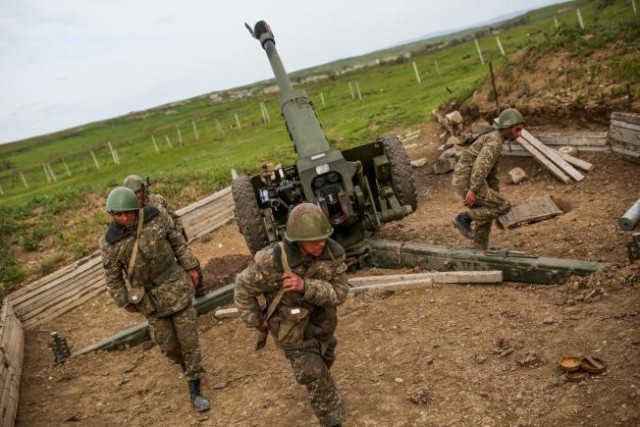
A fragile ceasefire between Armenian-backed separatists and Azerbaijan appears to have held on Wednesday, four days after fighting erupted. Regional leaders hope the agreement will end the worst outbreak of violence in Nagorno-Karabakh seen over the past two decades.
Hostilities broke out in the South Caucasus on Saturday morning with artillery fire, tank mobilizations, and helicopter flyovers threaten to end a 1994 truce between Armenia and Azerbaijan. Each side blamed the other for sparking the flare up in the mostly mountainous area. Baku claims to have captured several towns, suggesting the first possible change in the conflict’s frontline in 20 years.
Representatives from both sides visited Moscow and agreed to stop the violence at noon local time on Tuesday. Azerbaijan’s defense ministry accused separatists forces of breaking the ceasefire 115 times in a statement issued on Wednesday, but neither side appear to have an interest in further escalating the situation. So far the renewed fighting has left at least 64 people, mostly soldiers, dead.Considered a “Frozen Conflict” since the mid-1990s, ethnic Armenians have long controlled areas of Azerbaijan, as well as Nagorno-Karabakh, without any international recognition. Violence broke out between the two sides in the late 1980s with the collapse of the Soviet Union and escalated into full-scale nationalist/ethnic war. Civilians in mixed ethnic areas either fled or were forcibly displaced. In all, the conflict claimed the lives of about 30,000 people before a ceasefire was reached in 1994.
Since then, Armenia and Azerbaijan have been unable to agreed on a political solution to end their long running dispute. Known as the Minsk Group, U.S., French, and Russian diplomats have worked for years under the auspices of the Organization of Security and Cooperation in Europe (OSCE) to facilitate a durable peace and normalization agreement. This weekend’s incident shows they are a long way from success.
Regional meddling has also played a role in the stalled talks. Russia has sold arms to both the Armenians and the Azeris, but Moscow seems to be more aligned with Armenia on local issues. Meanwhile, Ankara’s outspoken support for Baku, and longtime disdain for the Armenians does little to enable trust and cooperation in the South Caucasus.





